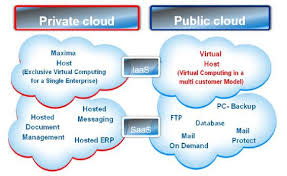The Different Types That Define Cloud Hosting

When it comes to premium hosting services, there are mainly two types running in the market today. One is dedicated hosting services which is excellent for big businesses facing huge volumes of traffic everyday and in need of premier security- which cannot be assured by shared servers. However, though unlimited dedicated hosting power assures quality web hosting yet it's pricey. Thus, the tech experts often advise for cloud hosting service which seems to be the order of the day now with the promise of excellent scalability and reliability at a rate cheaper than dedicated hosting.
In simple words, cloud hosting refers to hosting service for websites on the virtual servers, with computing resources sourced from interconnected physical servers. This way, your website gets the power from multiple servers working in a cluster or "cloud" and each of the servers carry out specific tasks. The great bit is that in case any of the servers face an issue, there are other servers to back up and eliminate downtime glitches for your website.
Different types of cloud hosting services-
Public cloud hosting
When it comes to most popular & cheapest cloud hosting solutions, you cannot look past public cloud services. In this case, you have a magnum cloud with unlimited resources & that cloud is shared with many web projects- and hence the name "public". It's somewhat similar to shared hosting plans where the cloud computing infrastructure would be shared between several organizations. Such hosting plans would be good for small business website with limited traffic.
Private cloud hosting
As the name suggests, with private cloud hosting plans, you will have full access to the entire cloud. Thus, you will several servers working for your website and your customers only, It promises exceptional security & very stable performance. Besides, private cloud hosting services also assures better flexibility and you have the facility to negotiate some special adjustments with your plan. It's quite natural that private cloud services would be more expensive compared to other options.
Hybrid cloud hosting
Hybrid cloud hosting services refers to a balanced blend of both public and private cloud hosting services. These hosting plans also include the best of dedicated servers. Together, these 3 technologies will assure you the great pay-as-you-go scalability, improved security & definitely ultra-fast performance.
Managed cloud hosting
If you have no time or lack the technical ability to manage your servers on your own, the managed cloud hosting services would be the ideal plan for you. In this case, your plan comes with not just the servers yet also a whole team of tech specialists – like systems administrator, cloud specialist, support engineer and database admin- to help you with the server management. This way, you can dedicate all your time into your major business operations and marketing plans without worrying about the servers.
Community cloud hosting
As the name suggests, community cloud hosting plan refers to a service where the whole cloud computing infrastructure is shared in between several organizations of same community. Say for example, all the government organizations of one State can go for community cloud hosting services for easy data management on citizens of that particular State.
All the types mentioned above refer to the types of cloud hosting services based on location of the cloud.
There are 3 more models when it comes to cloud computing based on services-
IaaS (Infrastructure as a Service)
Here you have a 3rd party provider hosting software, hardware, servers, storage as well as other needed infrastructure constituents on part of the users. These IaaS providers would even host the users' applications & tackle tasks like system maintenance or backup & resiliency planning.
SaaS (Software as a service)
Here you have a 3rd party provider hosting applications & making them available for the customers over internet. This way, the user organizations are relieved from the need to install & run the applications on the companies' own computers or data centers. You are saved from the expenses of the hardware acquisition, its maintenance, software licensing as well as installation & support.
PaaS (Platform as a Service)
The PaaS providers offer software and hardware tools necessary for the application development of a company. The users here won't have to install any in-house software or hardware as the PaaS provider only will do the hosting job for him, in his own infrastructure.
